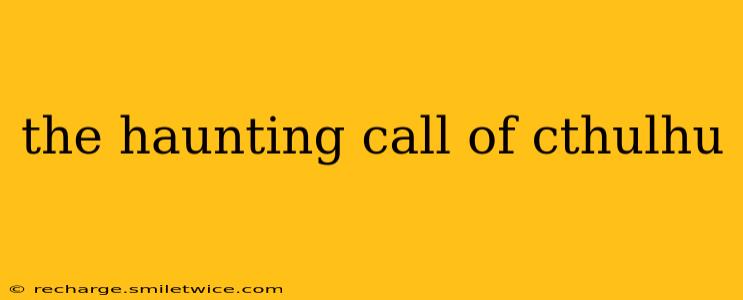H.P. Lovecraft's "The Call of Cthulhu" isn't just a horror story; it's a foundational text in the genre, establishing many of the tropes and themes that continue to resonate with readers and filmmakers today. This chilling tale introduces us to the cosmic horror of the Great Old Ones, beings so vast and alien that their mere existence threatens to shatter human sanity. But what makes this story so enduringly powerful? Let's delve into the depths of Lovecraft's masterpiece.
What is the Call of Cthulhu About?
The narrative centers around the investigation of an unsettling sculpture and a series of disturbing dreams experienced by the protagonist, a nephew inheriting his great-uncle's papers. These papers detail the great-uncle's obsessive research into a bizarre cult worshipping a gigantic, ancient entity known as Cthulhu. The story unfolds as a detective narrative, piecing together fragmented clues from across the globe, gradually revealing the horrifying truth about Cthulhu's existence and the cult's sinister practices. It's not merely a monster story; it's a story about the insignificance of humanity in the face of cosmic indifference.
Who is Cthulhu?
Cthulhu is a colossal, tentacled entity, a creature of nightmare born from the depths of the ocean, slumbering in a sunken city called R'lyeh. He's a being of immense power, representing a force far beyond human comprehension. He’s not simply evil in the traditional sense; he's something far more alien and terrifying – a manifestation of cosmic horror that transcends human morality and understanding. His very existence challenges our place in the universe, highlighting our fragile and ultimately insignificant position within it.
What are the Themes of The Call of Cthulhu?
Lovecraft masterfully weaves several potent themes throughout the narrative. These include:
- Cosmic Horror: This is the central theme. The story explores the idea that humanity is utterly insignificant in the grand scheme of the cosmos, facing entities of unimaginable power and alien intelligence. Our fears and concerns are trivial compared to the vast indifference of the universe.
- The Ineffable: Cthulhu's true form is largely indescribable; his horror lies in what we can't fully grasp. The story uses suggestive imagery and subtle descriptions to convey a sense of overwhelming dread and the limitations of human perception in the face of something truly alien.
- Insanity and the Fragility of the Human Mind: The story demonstrates how the human psyche can be overwhelmed by exposure to the terrifying truth about Cthulhu. The protagonist and others involved in the investigation experience unsettling dreams, hallucinations, and a creeping sense of madness.
- The Unreliable Narrator: The story is told from the perspective of the nephew, who is recounting the findings of his deceased great-uncle. This adds a layer of uncertainty and ambiguity, questioning the reliability of the information presented and enhancing the overall sense of unease.
What are the Key Symbols in The Call of Cthulhu?
Lovecraft employs powerful symbolism to enhance the story's impact:
- The Sculpture: The strange, unsettling sculpture acts as a key artifact, drawing the reader (and the characters) into the mystery surrounding Cthulhu. It serves as a physical manifestation of the cosmic horror.
- R'lyeh: The sunken city is a symbol of the hidden, unfathomable depths of the universe and the terrifying realities that lie beyond human understanding.
- Cthulhu Himself: Cthulhu is the ultimate symbol of cosmic indifference, an immense entity unconcerned with human affairs and beyond the grasp of human comprehension.
What is the Significance of Cthulhu's Sleep?
Cthulhu's current state of slumber is a crucial element of the story. It highlights the temporary nature of our safety, the potential for awakening this monstrous entity, and the constant underlying threat that hangs over humanity. The implication is that his awakening is not a matter of if, but when.
Is Cthulhu a God?
While followers refer to Cthulhu as a god, he isn't a god in the traditional sense. He represents a powerful, ancient being, a force of nature beyond human comprehension, rather than a benevolent or malevolent deity with defined intentions.
Why is The Call of Cthulhu Still Relevant Today?
"The Call of Cthulhu" endures because it taps into primal human fears: the fear of the unknown, the fear of the vast and uncaring universe, and the fear of our own insignificance. Its themes of cosmic horror and the fragility of the human mind continue to resonate with readers, making it a classic of the genre and a testament to Lovecraft's enduring power as a writer. The story’s enduring appeal also stems from its masterful use of atmosphere, suspense, and ambiguity. It's a story that stays with you long after you've finished reading it, a testament to Lovecraft's skill in crafting a truly haunting and unforgettable narrative.
